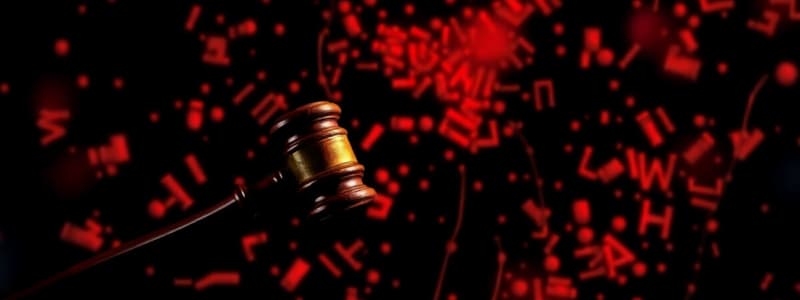Podcast
Questions and Answers
What is Intellectual Property and why is it important?
What is Intellectual Property and why is it important?
Intellectual Property refers to creations of the mind such as inventions, literary and artistic works, and symbols. It is important because it protects the rights of creators and encourages innovation.
How does defamation differ from privacy concerns in media?
How does defamation differ from privacy concerns in media?
Defamation involves making false statements that harm someone's reputation, while privacy concerns focus on an individual's right to control personal information. Both concepts are crucial for maintaining ethical standards in media.
Explain the ethical obligations associated with confidentiality in journalism.
Explain the ethical obligations associated with confidentiality in journalism.
Confidentiality in journalism involves the ethical and legal obligation to protect the identities of sources and sensitive information. This is vital for ensuring trust between journalists and their sources.
Define obscenity and explain its relevance to freedom of speech.
Define obscenity and explain its relevance to freedom of speech.
What distinguishes indecency from obscenity in terms of regulation?
What distinguishes indecency from obscenity in terms of regulation?
Flashcards
Intellectual Property
Intellectual Property
Creative work of the mind, like inventions or artistic creations.
Defamation
Defamation
False statements that harm someone's reputation, including written (libel) and spoken (slander) statements.
Privacy in media
Privacy in media
Individual's right to control and protect personal information, especially if not relevant to public understanding of a news story.
Freedom of Speech
Freedom of Speech
Signup and view all the flashcards
Obscenity
Obscenity
Signup and view all the flashcards
Study Notes
I
Intellectual Property
- Creations of the mind
- Intellectual property encompasses various types of intangible creations such as inventions, literary and artistic works, designs, symbols, names, and images used in commerce. These creations are legally protected to ensure that the creators can control and benefit from their work.
- The protection of intellectual property rights encourages innovation and creativity, as it allows authors, inventors, and businesses to safeguard their ideas and prevent unauthorized use by others.
Defamation
- False statement about a person
- Harms their reputation
- Includes libel (written) and slander (spoken)
- Defamation involves making untrue statements that can damage an individual's character or standing in the community. It can lead to severe emotional distress and financial repercussions for the victim.
- The burden of proof often lies with the person alleging defamation, requiring them to show that the statement made was indeed false and harmful.
Privacy (in media)
-
Privacy rights in media contexts refer to the protection individuals deserve regarding personal information and dignity against unauthorized dissemination by media entities.
-
This includes issues surrounding personal data usage, consent for publication, and the portrayal of individuals in a manner that may intrude upon their private lives.
-
Individual's right to control personal information
-
Protection from public disclosure, especially if irrelevant to a news story
Confidentiality
- Ethical and legal obligation
- Protect sources' identities and sensitive info
Freedom of Speech
- Right to express ideas, opinions, and information
- Without government interference, retaliation, or punishment
Fourth Estate
- Press or media
Clergy
- First Estate
Obscenity
- Category of speech unprotected by First Amendment
- Lewd, extremely offensive words or pictures in public
- Criteria: appeals to prurient interest; describes sexual conduct in patently offensive way; lacks serious literary, artistic, political, or scientific value
Indecency
-
FCC definition: Material depicting or describing sexual or excretory organs or activities
-
- as measured by contemporary community standards for broadcast media, it is essential to understand that these standards evolve over time. They reflect the prevailing perceptions and moral benchmarks that society holds regarding acceptable content on television, radio, and other forms of mass communication. These standards guide the responsible dissemination of information while ensuring the audience's welfare and cultural sensitivities are honored.
False Light
- False light is a legal concept that arises when a plaintiff is portrayed in a misleading manner that can harm their reputation or intrude upon their privacy, thereby causing emotional distress.
- The portrayal must be objectionable to a reasonable person, meaning that the individual must demonstrate that the representation would offend a typical member of the community.
- This legal claim can arise from situations where the information disseminated, while not entirely false, presents a distorted view that could lead to a misunderstanding about the person's character or actions.
Patently offensive
Studying That Suits You
Use AI to generate personalized quizzes and flashcards to suit your learning preferences.




